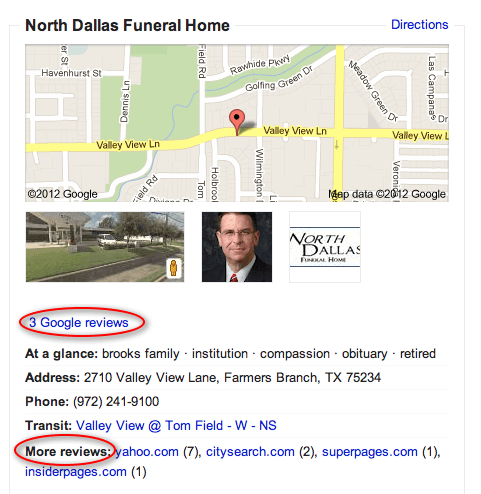Reviewing has become part of our culture today. It is a social activity that allows us to feel we can share our experiences within our community. With the ability for anyone to go online and have a voice, more people have become active reviewers.
We review hotels, restaurants, books, movies, and numerous other products and services. As consumers, we like to check out other people’s experiences with a product or service before we commit to buying.
Funeral home reviews had not been something so generally in the public domain. Word-of-mouth recommendations were the valuable commodity of the funeral director, and the hoards of glowing testimonials and letters from families served adorning walls.
Funeral homes may even electively choose to publish testimonials on their website, although consumers digest this as a somewhat slanted perspective.
Where can you find funeral home and cremation service reviews?
But now funeral homes are being dragged (sometimes kicking and screaming) into the 21st century. The ‘review revolution’ means that people are using tools on the Internet to now openly review funeral homes. Google is even helping direct consumers to where they can access these reviews as you will see from the example here.

If you use a directory site now to locate and compare funeral homes, you will notice that many of these sites have published reviews – Yellow Pages, Yelp, Superpages Citysearch, and Yahoo Local to name but a few. The only problem with this kind of unvalidated reviewing system is that it is open to abuse. Whilst we would hope that most reviewers post genuine feedback, a bad experience can lead to a bad review, and unfortunately we are too often spurred to leave feedback after a bad experience. This can generally be managed by a business when there is one main public site that people use to review services, such as Trip Adviser, so it is a central forum and allows for business manager to respond to reviews. But how does a business like a funeral home keep abreast of the multiple review forums it now appears on? And what happens when reviews are published by unverified “anonymous google users”? Is this a review to be trusted?
Social Media as a ‘space’ to interact Many funeral homes have also been convinced to step into the world of social media and have set up Facebook pages. Funeral marketing consultants have advised funeral homes that the answer to their marketing dilemma is to engage with their customers and communities in the forums they use – such as Facebook.
As a funeral consumer would you go to Facebook to find a funeral home? Would you choose to interact with a funeral home on Facebook – maybe place a review?
Several new innovations within the funeral industry in recent months and years have sought to address the issue of price comparison. The other online revolution that we as consumers seek out the tools for on the Internet. Seeing this as the directive by which many funeral consumers today structure their purchasing process, even offering funeral home price comparison surveys.
Reviews vs. price comparison So what dictates your purchasing decisions? Do you want to read reviews about a funeral home, do you want to compare prices, or do you just want someone to steer you to your local family-owned funeral home that can deliver a quality service at a low price?
At DFS Memorials we believe that everyone has the right to a simple and fair-priced funeral or cremation, handled by a local funeral professional who is not entirely governed by profit. We believe in transparency of ownership and price, so when you visit DFS Memorials and locate a funeral or cremation provider, we disclose their price and who they are. We ONLY work with local, family-owned funeral homes. We often work with the little guy in a community who doesn’t have the marketing budget or tech-savvy staff to drive his online presence, but he will serve his community with the best offering of service and price.
Alabama – Alaska – Arizona – Arkansas – California – Colorado – Connecticut – Delaware – Florida – Georgia – Hawaii – Idaho – Illinois – Indiana – Iowa – Kansas – Kentucky – Louisiana – Maine – Maryland – Massachusetts – Michigan – Minnesota – Mississippi – Missouri – Montana – Nebraska – Nevada – New Hampshire – New Jersey – New Mexico – New York – North Carolina – North Dakota – Ohio – Oklahoma – Oregon – Pennsylvania – Rhode Island – South Carolina – South Dakota – Tennessee – Texas – Utah – Vermont – Virginia – Washington – Washington DC – West Virginia – Wisconsin – Wyoming


